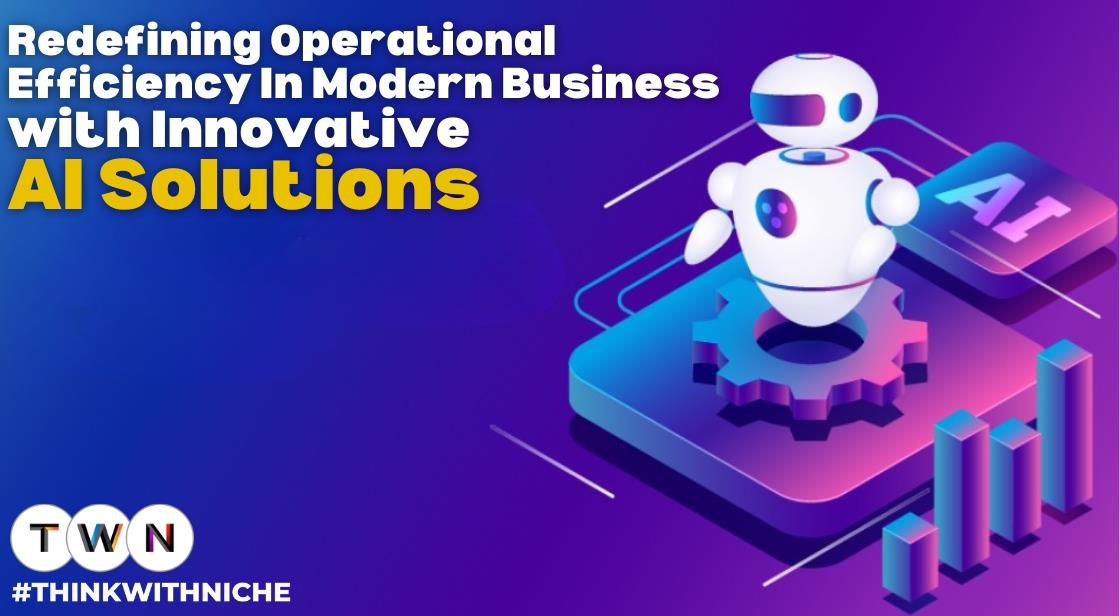Redefining Operational Efficiency in Modern Business with Innovative AI Solutions

Blog Post
In the ever-evolving landscape of business, operational efficiency remains a foundational pillar for success. Yet, as industries adapt to dynamic market demands and technological advancements, traditional methodologies face unprecedented challenges.
This transformation calls for innovative strategies that go beyond the conventional, prompting a closer look at Artificial Intelligence (AI) as the driving force revolutionizing operational paradigms.
At its core, operational efficiency extends far beyond cost-cutting measures or workflow acceleration. It now embodies a comprehensive optimization approach, encompassing everything from intricate supply chain orchestration to personalized customer engagement.
While established methodologies like lean management and Six Sigma have been instrumental in their time, the digital era poses new complexities, where massive data volumes and dynamic market shifts outpace their effectiveness.
Join us as we delve into the realms of AI-driven operational efficiency, exploring its transformative potential, the emergence of cutting-edge technologies, and the considerations and challenges businesses encounter in their pursuit of efficiency redefined.
Redefining Operational Efficiency in Modern Business with Innovative AI Solutions
Operational efficiency has long been a cornerstone of successful business management, focusing on maximizing output while minimizing input. However, the rapidly evolving business landscape demands more innovative approaches.
Artificial Intelligence has emerged as a pivotal tool in this transformation, reshaping how companies approach their operations.
Understanding Operational Efficiency
In today's dynamic business environment, operational efficiency transcends the traditional goals of merely reducing expenses or accelerating workflows. It encompasses a holistic optimization of diverse business facets, ranging from intricate supply chain management to responsive customer service.
This comprehensive approach aims to secure optimal outcomes by judiciously utilizing resources, thereby minimizing waste and maximizing value.
Historically, businesses have relied on methodologies such as lean management, Six Sigma, and various continuous improvement strategies to drive efficiency.
-
Lean management streamlines operations by eliminating waste and ensuring value creation aligns with customer needs.
-
Six Sigma, a data-driven approach, focuses on reducing process variation and enhancing quality.
However, these traditional methodologies, while groundbreaking in their time, now confront new challenges in the digital era. The exponential growth of data and the complexity of modern business processes have stretched these methods to their limits. Additionally, these methods may lack the agility needed to respond to rapidly changing market conditions and consumer expectations.
This limitation becomes particularly evident in data-intensive areas like supply chain management and customer relationship management. Here, the traditional approaches might falter in synthesizing vast amounts of data from various sources to provide actionable insights.
As businesses evolve and the digital landscape becomes more complex, the need for more advanced, data-centric approaches becomes clear. This gap is where innovative AI solutions are stepping in, offering new ways to enhance operational efficiency by harnessing the power of modern technology to process, analyze, and act on data more effectively and efficiently.
Also Read: How AI Transformed Healthcare in 2023: Redefining Diagnosis and Treatment
The Emergence of AI in Business Operations
Initially emerging as a specialized scientific field, AI has swiftly expanded its influence, seamlessly integrating into various facets of modern business. This integration signifies a major shift in operational strategies, where AI technologies are no longer mere support tools but fundamental elements driving business processes.
ML
Machine learning algorithms stand at the forefront of this revolution. These algorithms possess the unique capability to sift through and analyze massive, complex datasets, extracting valuable insights that drive informed decision-making.
By identifying patterns and predicting trends, machine learning enables businesses to anticipate market changes, optimize operations, and personalize customer experiences. One specific field where AI has brought groundbreaking changes is translation. With AI translation software, businesses can significantly speed up and scale the process of translation and localization.
NLP
Natural language processing (NLP) has similarly transformed the landscape of customer interactions. Through advanced chatbots and virtual assistants, NLP technology has redefined communication standards between businesses and their customers.
These AI-driven tools provide instant, intelligent responses to customer inquiries, ensuring a more efficient and engaging customer service experience. They not only handle routine queries with ease but also learn and adapt from interactions, continuously improving their responses and functionality.
Robotics
Robotics, another critical AI domain, has revolutionized traditional manufacturing and logistics operations. Robots, equipped with AI, perform tasks with precision and speed unmatched by human capabilities, significantly boosting productivity.
In logistics, AI-powered robots optimize inventory management and streamline the entire supply chain, from warehousing to distribution. The use of robotics in these areas not only speeds up processes but also reduces errors, ensuring a more reliable and efficient operation.
Challenges and Considerations
Integrating AI into business operations, while promising, presents several notable challenges:
-
The foremost of these is the substantial cost involved in deploying AI solutions. This financial burden can especially impact small and medium-sized enterprises, which may lack the capital for such significant investments.
-
Moreover, the complexity of AI systems requires specific technical expertise. This necessity often leads to businesses investing heavily in employee training programs to develop the required skills among their existing workforce.
-
Ethical considerations also play a crucial role in the integration of AI. Data privacy emerges as a paramount concern, with businesses needing to ensure that their use of AI complies with legal standards and respects customer privacy.
-
Finally, the risk of job displacement due to automation represents a significant ethical and social challenge. As AI and robotics take over tasks traditionally performed by humans, companies face the dilemma of managing workforce reductions or reassignments.
Conclusion
By enabling more precise, faster, and smarter operations, AI is not just a tool for optimization but a catalyst for redefining what is possible in business efficiency. As we move forward, the integration of AI solutions will become an essential strategy for businesses aiming to stay competitive and innovative.
You May Like
EDITOR’S CHOICE












